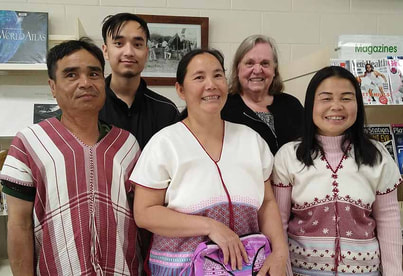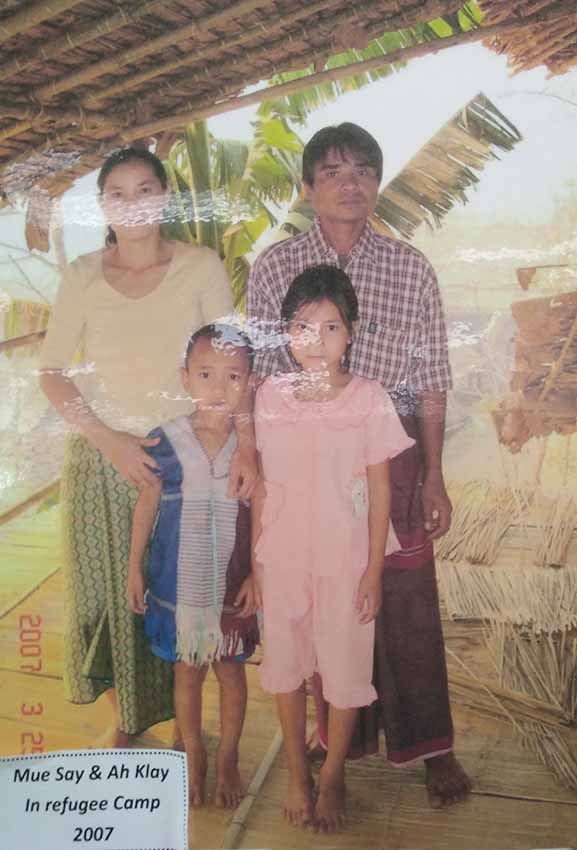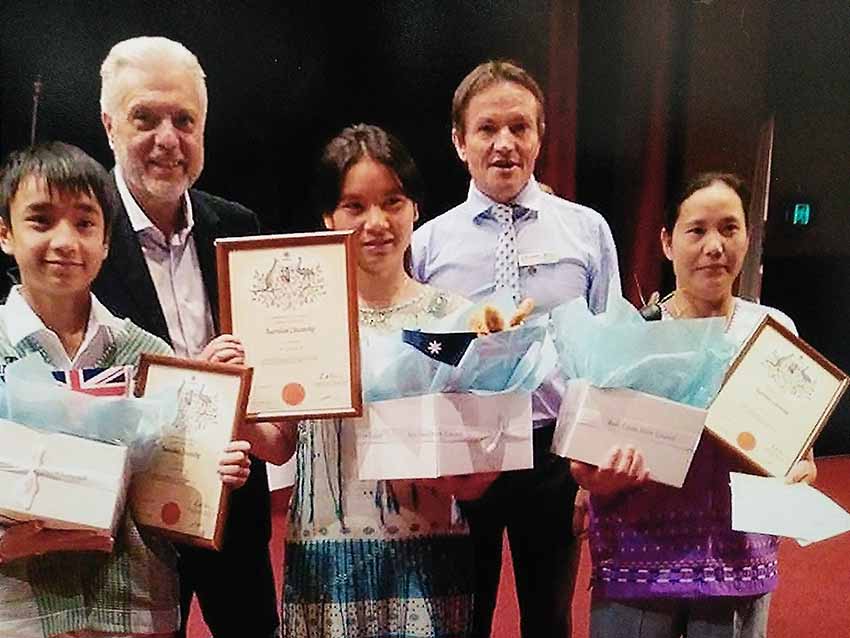 Mue Hsay, front centre, with husband Ah Klay, left, and her friend Mu Ha, right; back: her son April Htoo and the family’s sponsor, Sylvia Davey, at the Wonthaggi Library where Mue Hsay gave a talk for Harmony Week.
Mue Hsay, front centre, with husband Ah Klay, left, and her friend Mu Ha, right; back: her son April Htoo and the family’s sponsor, Sylvia Davey, at the Wonthaggi Library where Mue Hsay gave a talk for Harmony Week. By Mue Hsay
I AM a Karen woman. I was born in Burma (Myanmar). My mum passed away when I was eight years old. After that, I worked for people. I was a babysitter, I grew rice and I looked after cows. I did whatever I could do to get things like clothes. I never went to school.
I married my husband, Ah Klay, in 1993. Our baby died after falling ill. We found it very hard to get medicine.
It was not safe in Burma. Our family lived in a small village, we had to keep leaving where we were living. The army would raid village after village. When the army came to a village, they would take food. Sometimes kill the animals. Sometimes, they took people with them to carry their things as they went on their way. We would run, and the army would come again. They burn down our hut. We had to keep moving.
I AM a Karen woman. I was born in Burma (Myanmar). My mum passed away when I was eight years old. After that, I worked for people. I was a babysitter, I grew rice and I looked after cows. I did whatever I could do to get things like clothes. I never went to school.
I married my husband, Ah Klay, in 1993. Our baby died after falling ill. We found it very hard to get medicine.
It was not safe in Burma. Our family lived in a small village, we had to keep leaving where we were living. The army would raid village after village. When the army came to a village, they would take food. Sometimes kill the animals. Sometimes, they took people with them to carry their things as they went on their way. We would run, and the army would come again. They burn down our hut. We had to keep moving.
I lost my leg in 1998. I stood on a landmine. I was pregnant with my second daughter at the time. My family took me to hospital, but I couldn't stay there. We didn't have enough money. I left the hospital and later gave birth to my daughter Daw Wah Hsee in our village.
| I couldn't walk for one year after I lost my leg. I had no crutches, nothing to use. It was too hard for me to get a new leg. So my father, my brother, my sister, my husband, my whole family carried me through the jungle. They carried me on bamboo. It was very hard. It took us three days to get to Thailand. When we got there, we stayed at the Mae La refugee camp on the Thai side of the border with Burma. My father stayed with me only one month, and he went back to Burma. I thought it will be a short time at the camp and then I will get better and go back to my village. But I didn't get better. I became pregnant and gave birth to our son in the camp. I didn't like the camp much. It was like jail. the Thai police used to take food and money off the refugees. It was very hard looking for food – there was never enough. We got a basic food pack – rice, oil and chilli – once a month and we grew a few vegetables. I slept on a bamboo floor; my hut was only small. Then one day, I was walking around my hut and the monk asked me, do you want to go to another country? I said yes, I want to go. So, we applied, I did an interview and two years later, I found out we were going to Australia. We arrived in Australia on 19 August 2008. It was winter, and I nearly froze. I came with only one bag. We didn't own many clothes. I had one week of training in the Australia way of life, but that didn't prepare me or my family. We experienced many firsts when we came to Australia. It was my first time on a plane, my first time in a car, my first time seeing a lawn mower and my first time going to the beach. I couldn't have done it without our Australia host family. They picked us up from the airport and we lived at their house in Wonthaggi until we found a place to rent. They are still close by, even to this day. In Australia, our children went to school and my husband worked at the local meatworks. I learnt English and made friends at the local neighbourhood house. I go there three times a week now for gardening, socialising and knitting, and I do English classes twice a week at the adult learning centre. We bought our own home in North Wonthaggi six years after arriving in Australia. In Burma, no house. In Thailand, no house. It's just here – Australia – where we have our own house. My children and I became Australian citizens in 2013. Ah Klay became an Australian citizen in 2016. I think it's good, Australia. I have good friends. A lot of people are helpful. I would like to stay here. I am very safe here with my family. | ‘We were very naive’ By Sylvia Davey A few families got together. We knew we couldn’t save the world but we thought we could at least offer hope to some families. Eventually we were given photos of refugee families and told to choose. We decided it would either be women at risk or amputees. In the end, I just said “I can’t make a choice. Just give me a family.” And we were lucky enough to get Mue Hsay and her family. I can remember we picked them up at the airport. It was strange the things they knew and the things they didn’t know. The kids knew all the latest songs but they’d never been in a vehicle before. Of course they’d never heard of Wonthaggi. We could have been taking them anywhere. It was difficult for them. They’d never had hot water come out of a tap. The first time my husband went out to mow the lawn, they thought they were being attacked. And they couldn’t understand why we had all these plants in the garden that you couldn’t eat. We were very naïve. The morning after the first group arrived, we decided to get them all together at the South Dudley school and sort out the paperwork. Of course we needed a JP to witness their signatures. A policeman walked in and every woman in the room started to cry. Of course they were very fearful of the police. I threw my arms around the officer and told him to pretend he was my friend! Now they are very relaxed with the police. Mue Hsay’s nephew had lived with them in the refugee camp but because he wasn’t part of the family they had to leave him behind. He was 14. Eventually we were able to get him out as well. Now he lives in Geelong and has a wife and children. Sylvia Davey was one of a group of Wonthaggi people who sponsored several Karen families from Myanmar (Burma) around 2008. She told her part of the experience. |
I am thankful to my community, government, and friends for accepting my family and me. And I am really grateful to my sponsor, Sylvia, for helping and bringing us to a safer place.
Mue Hsay told her story at the Wonthaggi library as part of Harmony Week. Her son April Htoo read her story and helped her to answer questions from the audience.
Mue Hsay told her story at the Wonthaggi library as part of Harmony Week. Her son April Htoo read her story and helped her to answer questions from the audience.

